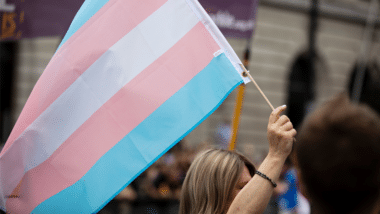Women’s groups are threatening legal action following the introduction of the Scottish Government’s Gender Recognition Reform (Scotland) Bill, which proposes allowing people to change their sex based on self-declaration.
Yesterday, Social Justice Secretary Shona Robison tabled the draft Bill at Holyrood, despite calls for legislation to be paused amid widespread concern that a self-ID system would trample on women’s sex-based rights.
By making the option to change legal sex available to more people and the process to do so much easier, the women say the Scottish Government is giving men “a passport to enter women’s single-sex spaces”.
Legitimate concerns
Currently, Scots wishing to ‘change sex’ must have a medical diagnosis of gender dysphoria and to have lived as if a member of their chosen sex for at least two years.
But, the new Bill proposes ditching the requirement for the approval of two doctors and instead allow anyone to change sex by making a “personal declaration”. If passed, it would also reduce the waiting time to just six months and lower the age that people can apply for a Gender Recognition Certificate from 18 to 16.
Four out of the five Holyrood parties have expressed support for making changes easier. But Conservative MSP Meghan Gallacher said that, as drafted, the proposed changes “do not offer enough protection for women’s safety”.a passport to enter women’s single-sex spaces
“The concerns of women are legitimate and they are reasonable, and they are honestly and sincerely held.” She added that the cabinet secretary should “listen again to the valid concerns of women who feel their rights are under threat”.
State overreach
Dr Nicola Williams, Director of Fair Play for Women, said the proposed reforms fall outside of the law, warning that “changing who can be recognised as what sex anywhere in the UK is outside the legislative competence of the Scottish parliament”.
She said the proposed changes contained in the Bill “would allow anyone, for any reason, to hide the sex they were born by changing the sex written on their birth certificate.
“This extraordinary privilege was originally granted to severely dysphoric transsexuals but could now be extended to a new and much larger group of people, including those born outside Scotland.
“The ramifications for women’s rights stretch across the whole of the UK. If passed, the Scottish Parliament will be reaching well beyond its devolved powers. This is unlawful and will need to be fought, once again, in the courts. I will not stand by as women’s sex-based rights are eroded.”
Unanswered questions
Susan Smith, a director of For Women Scotland, said: “Recently, groups representing women, LGB people, parents, detransitioners and medics finally met Shona Robison. We raised dozens of questions, none of which were answered.
“Why are ministers expanding the pool eligible for a gender recognition certificate from a small group with gender dysphoria to any man for any reason, effectively giving them a passport to enter women’s single-sex spaces?
“They say that men assault women anyway or that wrongdoers will be punished after the fact. The first is a counsel of despair, the second laughable in the face of conviction rates for rape.a passport to enter women’s single-sex spaces
“If this were about making life easier for people with dysphoria, few would object. Instead, the arguments have focused on access to women’s spaces and to demands that we give up our hard-won rights. This is about erasing women in law and language. And we will fight it.”
Children at risk
Frontline Feminists Scotland said the Scottish Government had been misleading the public as to the ramifications of changing the law, as it claims there would be no erosion of women’s rights.
A spokeswoman said: “You can’t claim that you support single-sex spaces when men self-identifying as women are casually allowed to wander into women’s changing rooms and when rapists are housed alongside women prisoners and you do nothing about it”.
She added that other measures, such as allowing schools to impose gender-neutral toilets upon students, have already put girls as young as twelve at risk of sexual assault and sexual coercion as a result of having to share facilities with 17 and 18-year-old males.
The Institute’s Ciarán Kelly said “This is simply wrong and expands the legal fiction that it is possible for a man to become a woman or for a woman to become a man. It isn’t”.
Greens face legal action after sacking spokesman for ‘transphobia’
Academics urge Cardiff Uni to ‘denounce harassment’ by trans activists
Girl Guides Aus CEO sacked for questioning pro-trans membership policy
Guardian journalist attacks ‘progressive’ media for capitulation to trans activists


